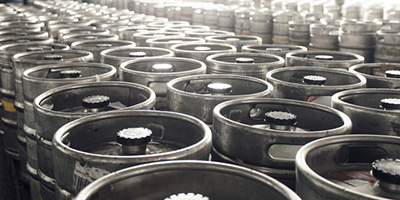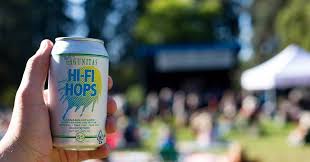In the Doghouse
Sting Finds Fraud In Up To 70% of CA Brewpubs
 A recent California Department of Alcoholic Beverage Control (ABC) operation targeting 70 licensed brewpubs found nearly 50 of them to be in violation of the terms of their license, the department announced. Brewpubs, defined as bars and restaurants that brew their own beer for sale, are allowed a full liquor bar so long as they meet a certain quote of beer production and sale. Approximately 150 venues in California qualify as brewpubs.
A recent California Department of Alcoholic Beverage Control (ABC) operation targeting 70 licensed brewpubs found nearly 50 of them to be in violation of the terms of their license, the department announced. Brewpubs, defined as bars and restaurants that brew their own beer for sale, are allowed a full liquor bar so long as they meet a certain quote of beer production and sale. Approximately 150 venues in California qualify as brewpubs."This is an outrage, but not a surprise," said Michael Scippa, Public Relations Director of Alcohol Justice. "Give the industry an inch, they'll take a mile, and these brewpub licenses were a mile to begin with."
Brewpubs operate on what is classified as a Type 75 license, distinct from a normal full-bar Type 47 license. Under Type 75, the venue can maintain a full bar so long as it brews at least 200 barrels of beer on-site each year while operating a full restaurant. The exemption was originally carved out to provide an economic boost for craft breweries, but many licensees saw it as a cheap end-run around the more limited Type 47. As the Napa Valley Register notes, Type 75 licensees historically did not even have to sell the beer. They could donate it, give it away, or pour it down the drain, while retaining the income from the full liquor bar.
The California legislature modified the production requirement this year, raising the minimum production to 200 barrels per year, and requiring documented sales. However, many of the venues ABC investigated were not even able to meet the pre-2018 requirements. Even restaurants intending to follow the new requirements may fall short in 2019. The Register calculates that, for all purported brewpubs in Napa to meet their sale minimums, every single beer-drinking tourist would have to buy two pints from a brewpub specifically--on top of everything they drink from establishments with other types of of licenses in the area.
According to ABC Deputy Director Eric Hirata, disciplinary actions against violators ranged from a suspension of their hard liquor privileges to a full revocation of their license. Some venues simply surrendered their Type 75 license outright, rather than try and comply with the brewing requirements. But ultimately, public involvement in the monitoring process is essential to preventing ongoing abuse.
"The community can assist in keeping Type 75 licensees in compliance by telephoning complaint to their local ABC district office," Deput Director Hirata advised via email.
Not all community members are convinced that brewpubs can or should be simply kept in line. "The Type 75 was always an open invitation for fraud," said Mr. Scippa. "Rather than enforce or reform it, we need to get rid of it."
A list of local ABC offices is available here.
Heineken’s Pot Beer Smoke Screen
To public health advocates burnt by fighting against toxic industries, the legal marijuana landscape has two big pitfalls in it:
- The creation of a marijuana industry with the wealth and political clout to flout and defang all harm prevention policies.
- The cooption of the marijuana industry by companies that already have the wealth and political clout to flout and defang all harm prevention policies.
Hi-Fi Hops , the new foray into drinkable cannabis from Heineken, shows every sign of the latter. The product, sold under Heineken’s phony-craft Lagunitas label, intentionally circumvents California labeling and licensing restrictions intended to separate the marijuana and alcohol marketplaces. According to guidance issued by the California Department of Alcoholic Beverage Control, retailers cannot sell both alcohol and marijuana in the same location, nor can they sell cannabis-infused alcohol products.
, the new foray into drinkable cannabis from Heineken, shows every sign of the latter. The product, sold under Heineken’s phony-craft Lagunitas label, intentionally circumvents California labeling and licensing restrictions intended to separate the marijuana and alcohol marketplaces. According to guidance issued by the California Department of Alcoholic Beverage Control, retailers cannot sell both alcohol and marijuana in the same location, nor can they sell cannabis-infused alcohol products.
These simple and straightforward rules did nothing to deter Heineken. Its Hi-Fi Hops product features the Lagunitas label and carbonated water produced by Lagunitas, but has THC and CBD added in by a second company (Cannacraft, headed up by CEO Bill Silver, founder of the Wine Business Institute at Sonoma State University). Since the drink is alcohol-free and the cannabinoids are added in at a second location, Heineken obeys the letter of the law while showing contempt for the spirit.
Separating alcohol from cannabis helps both denormalize alcohol and discourage the mixing of the two. The harm from the latter is obvious and well-documented: mixing alcohol and marijuana is more incapacitating and dangerous than using either alone. The harm from normalization, however, is more pervasive.
Normalization is Big Alcohol’s lifeblood. They can only continue to sell more product if people drink in more situations and/or more heavily than they used to. This is why we are seeing a constant chipping away at the firewalls between alcohol service and day-to-day life: persistent efforts to roll back advertising restrictions, extend last call hours, and facilitate serving alcohol on school campuses, among other recent legislative eyesores.
Having consumers associate alcohol with marijuana use has an added benefit in that consumers, in a void, may preferentially choose marijuana to the exclusion of alcohol. According to the New York Times, Molson Coors advised its stockholders that “legal cannabis … may result in a shift of discretionary income away from our products or a change in consumer preferences away from beer." This has led to major buyouts of cannabis product companies by Molson Coors and Constellation Brands (who make Corona beer and Svedka vodka, among other mass-market brands), as well as Heineken’s exploitive partnership.
This kind of could signal the beginning of a trend that Alcohol Justice has long warned against. California cannot afford to make the same mistakes with marijuana regulation that we made with alcohol regulation. Either get Heineken’s brand names off Hi-Fi Hops or get Hi-Fi Hops off the shelves.
READ MORE about how Big Alcohol undermines public health and safety.
Corrupt NIAAA "Healthy Drinking" Trial Suspended
In a short-term victory for public health and transparency, the National Institute on Alcohol Abuse and Alcoholism (NIAAA) has suspended its controversial MACH15 trial. The trial, designed to fish for evidence of the health benefits of "moderate" drinking, received $67 million in funding from Big Alcohol, rendering it suspect from the outset. Now, under pressure from watchdog groups and congress, National Institutes of Health (NIH) Director Francis Collins stopped enrollment in the study and ordered official reviews of NIAAA's process.As the Washington Post reports, Collins told congress that "this particular study was set up in such a way that the funding is largely coming from the beverage industry and there is evidence that NIH employees assisted in recruiting those funds for this study in a way that would violate our usual policies." The NIH had rejected similar funding offers from pharma companies this past April, Collins noted.
Pressure from civic groups, spearheaded by Public Citizen and strongly supported by Alcohol Justice, brought the funding issue to the forefront of public debate. The issues at NIAAA, however, run deeper than an ill-conceived study. The proverbial "revolving door" has seen NIAAA Director George Koob go from alcohol industry research groups to public health. In the process, he promised to end government support of research into harmful marketing practices despite findings of major significance to the health promotion community. In addition, he had direct contact with alcohol industry representatives, reassuring them the institute would back away from research that cast Big Alcohol in a bad light.
Despite the suspension and review of the study, Public Citizen believes more needs to be done. In a statement, Dr. Michael Carome, director of Public Citizen's Health Research Group, said, "The institute cannot function effectively without independence from the alcohol industry and must support science-based inquiry into industry practices without fear of industry retaliation." He calls for the removal of Dr. Koob, and a full investigation from the inspector general of the Department of Health and Human Services, which oversees NIH. Still, he tells the <em>Post</em>, halting the study "is a small step towards restoring [NIH's] reputation."
"Suspending the study is not the same as ending it," said Carson Benowitz-Fredericks, Research Manager at Alcohol Justice. "If NIH decides its hands are clean, they can start it right back up. We need to move now to make sure NIH remembers its mission, dumps the dirty money, and refuses to be a marketing tool for Big Alcohol."
TAKE ACTION to tell your representatives to end the corrupt NIAAA study.
READ MORE about how the study is rigged to benefit Big Alcohol.
READ MORE about the myths of "healthy drinking".
More Articles ...
Help us hold Big Alcohol accountable for the harm its products cause.
| GET ACTION ALERTS AND eNEWS |
STAY CONNECTED    |
CONTACT US 24 Belvedere St. San Rafael, CA 94901 415-456-5692 |
SUPPORT US Terms of Service & Privacy Policy |


